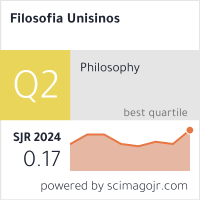Critical Theory and Barbarity. The Future of the Administered Society
Resumen
At the end of the 18th century Jeremy Bentham proposed in his famous work, The Panopticon, a system of surveillance for the reform schools that could be extended to any institution without exception. If we take into account Istvan Mészáros’ denunciation that Microsoft has mechanisms to control any computer program through an access device from the company itself, we conclude that Bantham’s proposal – which was also critically projected by Orwell in the first half of the 20th century – has been established among us. Cameras control our movements, follow our steps, inspect our intimacy – even in the isolation of the cash machines. This controlled society, however, is not restricted to the visible aspects of that control. In the late capitalist society the administration of life and things controls individuals on the basis of a philosophical category that is very dear to Western intellectuals: the Enlightenment. The idea that knowledge and science would liberate man from the darkness of ignorance and superstition has always been a belief of Western philosophers and sociologists. However, this science and particularly its advanced form – technology – has turned the emancipatory project into a new prison where an invisible – both political and economic (ideology and the market, for instance) – control ended up turning civilization into barbarity. This article analyzes the present situation using instruments offered by the Critical Theory – which investigates this totally administered society – and points out the advantages and limits of a society in which “administration” has disseminated all over the planet and globalization has even extended its tentacles to the peripheral regions in a perverse manner.
Key words: barbarity, Critical Theory, administered society, Praxis, Enlightenment.Descargas
Métricas
Descargas
Publicado
Cómo citar
Número
Sección
Licencia
Concedo a revista Filosofia Unisinos – Unisinos Journal of Philosophy o direito de primeira publicação da versão revisada do meu artigo, licenciado sob a Licença Creative Commons Attribution 4.0 (que permite o compartilhamento do trabalho com reconhecimento da autoria e publicação inicial nesta revista).
Afirmo ainda que meu artigo não está sendo submetido a outra publicação e não foi publicado na íntegra em outro periódico e assumo total responsabilidade por sua originalidade, podendo incidir sobre mim eventuais encargos decorrentes de reivindicação, por parte de terceiros, em relação à autoria do mesmo.










